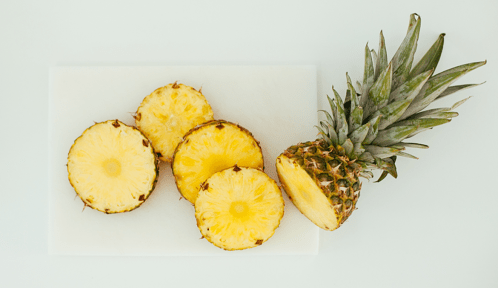‘Pineapple Tongue’ Is a Legitimate Thing, Says an ENT—Here’s How To Stop the Burning Sensation in Its Tracks
Discover why you might experience pineapple tongue irritation after eating the fruit and how to prevent it, according to an ENT.

One bite of pineapple and my fate is usually sealed: For the next several hours, my tongue will feel like the texture of sandpaper and has a (rather uncomfortable) tingly sensation. Despite the discomfort, what’s comforting to know is that I’m definitely not alone—tons of folks have taken to social media to express their concerns over a similar experience.
Experts in This Article
otolaryngologist affiliated with Community Hospital in Munster, Indiana
I’ll be frank: In the past, I’ve chalked up my pineapple-induced mouth woes to nothing more than a very mild allergy of some sort (since my symptoms clear up on their own after a while). However, Inna A. Husain, MD, the medical director of laryngology at Community Hospital in Munster, Indiana, says an allergy is likely not the case.
While pineapple allergies are possible, they’re extremely rare. So, why do so many people experience discomfort when noshing on this tropical fruit? Dr. Husain explains it’s simple: Enzymes. Ahead we uncover the root cause of ‘pineapple tongue’ discomfort and the best way to avoid it.
Why pineapple can cause mouth and tongue irritation
According to Dr. Husain, pineapples contain an enzyme called bromelain, which is likely the main culprit behind most pineapple-related mouth and tongue irritation. “Bromelain is a combination of two proteases. For context, a protease is a special type of enzyme that breaks down protein. This is why pineapple can be a great meat tenderizer,” Dr. Husain says. Unfortunately, pineapple can cause a similar reaction in the mouth. “Bromelain also breaks down protein found in the lining of your mouth, known as mucosa,” she adds, which results in the irritation so many of us often experience.
But that’s just one piece of the puzzle. In addition to the bromelain, Dr. Husain points out that pineapples are also naturally acidic, which can further exacerbate irritation. “Pineapple is acidic, so the thought is that the bromelain breaks down the mucosal barrier, which causes the acid in pineapple to be more irritating,” she says. Dr. Husain says the combination of the two is what sets pineapple apart from other fruits. (For example, although papayas also contain bromelain, they’re not as acidic, which is why most won’t experience the same tingling sensation as they do with pineapple.)
That said, there’s no denying that all this talk about bromelain-induced burning or itchiness in the mouth and throat can sound exceptionally alarming. However, Dr. Husain reassures us that it isn’t too much cause for concern (at least not in most cases). “Don’t worry. The amount of damage that is happening is mild, and the tissue will already start healing itself after the consumption of the pineapple. This is why most of the time, the sensation is brief,” she says.
“Don’t worry. The amount of damage that is happening is mild, and the tissue will already start healing itself after the consumption of the pineapple. This is why most of the time, the sensation is brief.”
But it’s worth noting that although (we reiterate) pineapple allergies are rare, they still are possible. A pineapple allergy can result in more severe symptoms like excessive irritation in the mouth, rashes, swelling, or—in severe cases—anaphylaxis, a life-threatening condition that needs urgent medical attention. If you believe you’re experiencing a pineapple allergy, it’s best to consult with a medical professional on how to treat it.
How to prevent pineapple tongue irritation
Although there’s no avoiding bromelain in pineapples, Dr. Husain points out that the highest concentration of the enzyme is found in the stem of the pineapple. As such, steering clear of consuming the stems might help mitigate the reaction. But it isn’t foolproof, nor the most productive or effective way to avoid pineapple-induced irritation.
Dr. Husain recommends rubbing salt on pineapple or soaking it in salt water (and rinsing before consumption). Cooking pineapple can also reduce the irritation caused by enzymes. Lastly, she says pairing the acidic fruit with dairy-based products, like cream or yogurt, can help neutralize the acid. Pineapples are officially back on the menu!
Anyone up for a dairy-free pineapple ginger Dole Whip dessert:
Sign Up for Our Daily Newsletter
Get all the latest in wellness, trends, food, fitness, beauty, and more delivered right to your inbox.
Got it, you've been added to our email list.










